The Department of Computer Science and Software Engineering held their annual High School Hawk Hack on Friday, Feb. 7. Fifty students from ten New Jersey high schools participated. The event is run by the student-led club of the Institute of Electrical and Electronics Engineers/ Association for Computing Machinery, (IEEE/ACM) and Professor Rolf Kamp, who is the club advisor. Please see the following Outlook article (written by Gillian DeStefano) for a detailed account of the event.
-
Annual Computer Science Hawk Hack
-
Pi Day Celebration
The Department of Mathematics celebrated Pi Day early this year on Tuesday, March 13. It also happened to be International Women in Mathematics Day. It was very fitting that the two speakers represented the next generation of women in mathematics. Miriam Abecasis (Monmouth University) and Willow Denker (Binghamton University) shared the results of their ongoing research with Professor Gallagher. Following the talks, students and faculty had pies and participated in raffles in the Math Learning Center.
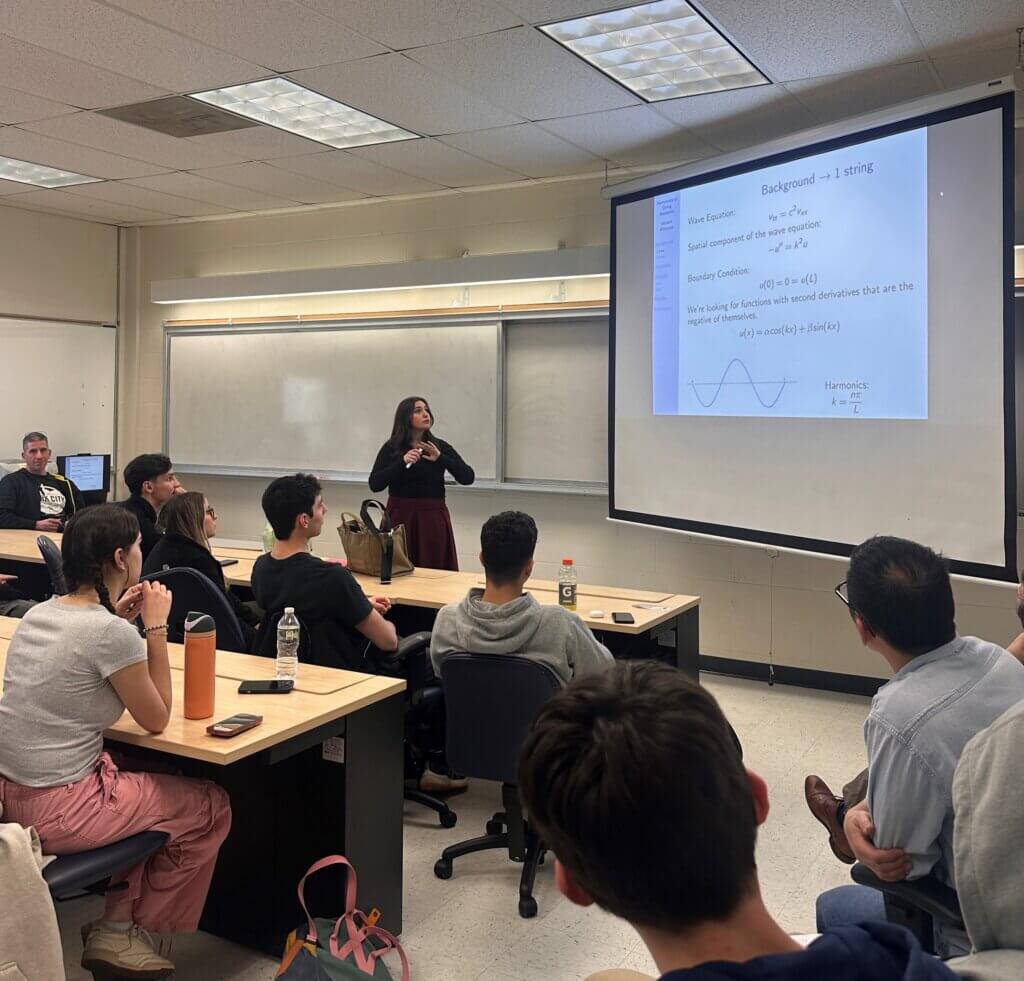
Miriam Abecasis 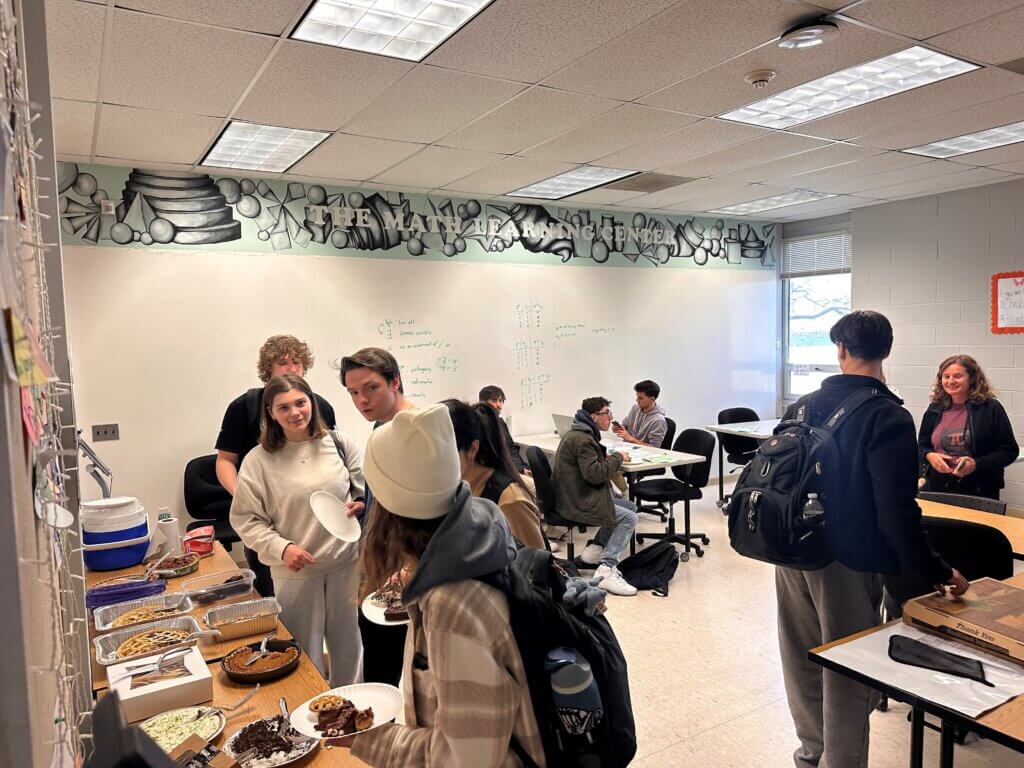
All kinds of Pi(e)! 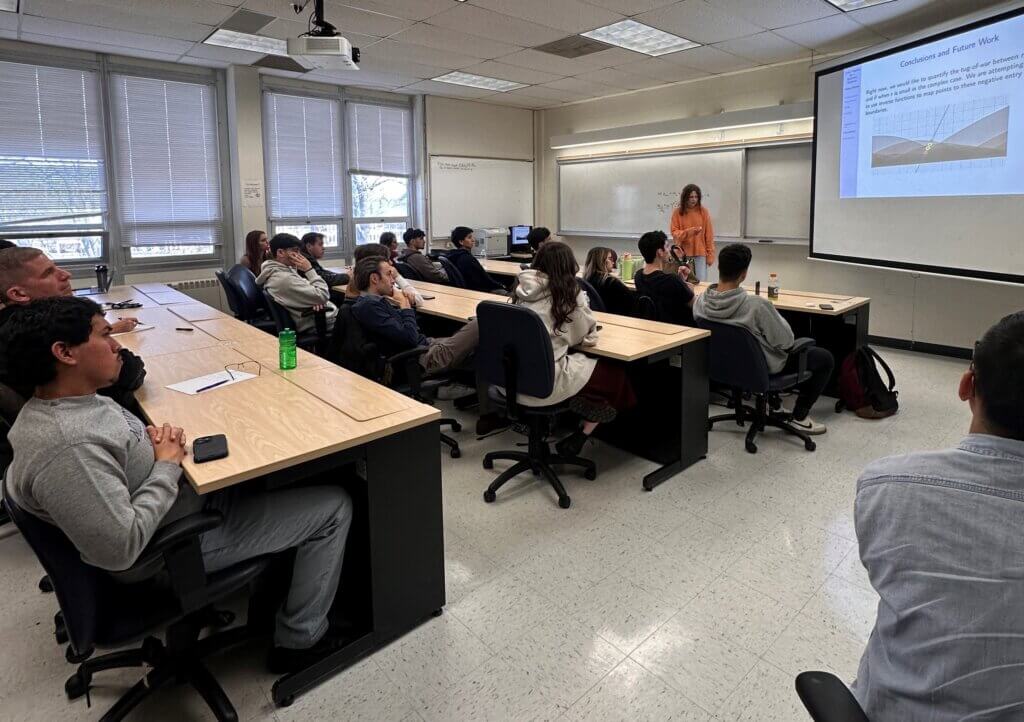
Willow Deneker -
School of Science student and professor highlight discovery a non-native sea anemone
Monmouth MEBP major Diedrik Boonman and Faculty member Jason Adolf are part of a team that recently published an article highlighting the initial 2021 discovery and subsequent examination in 2023 of a non-native sea anemone species. This marks the first record of the sea anemone Antinia Equina found on the Mid-Atlantic Coast of the United States. These animals were found in multiple sites on man-made rocky structures of the beaches of Monmouth County, New Jersey, on the Mid-Atlantic Coast of the United States. Student Dietrik Boonman is the first author on the article. The image below shows the anemone with tentacles extended (a-e) and tentacles contracted (f-j). More details can be found in the article published in the Journal of the Marine Biological Association of the United Kingdom found here.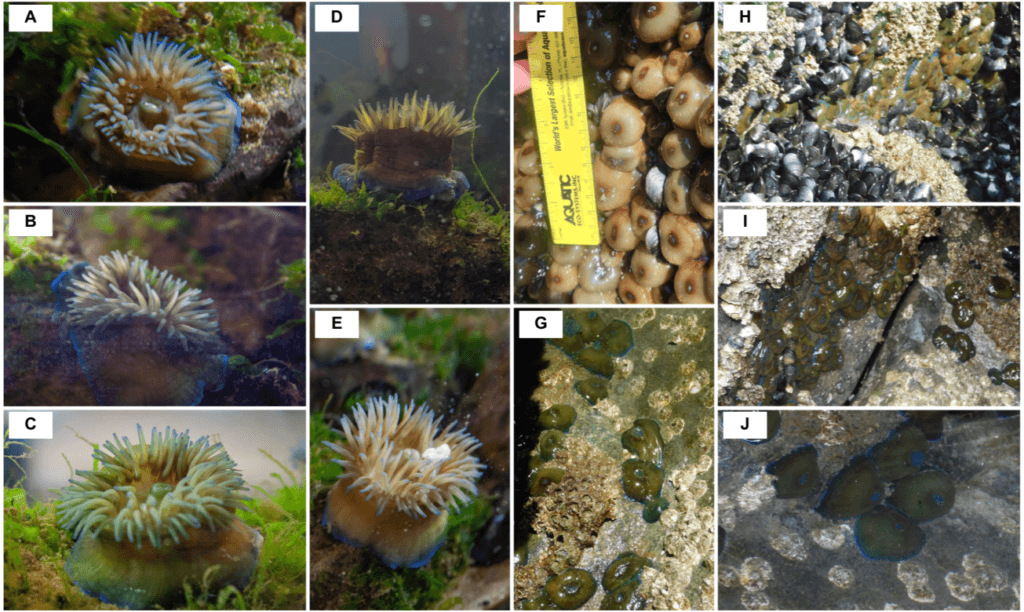
-
First Climate Teach-In of 2025: Exploring the “How” of Sustainability Transformations
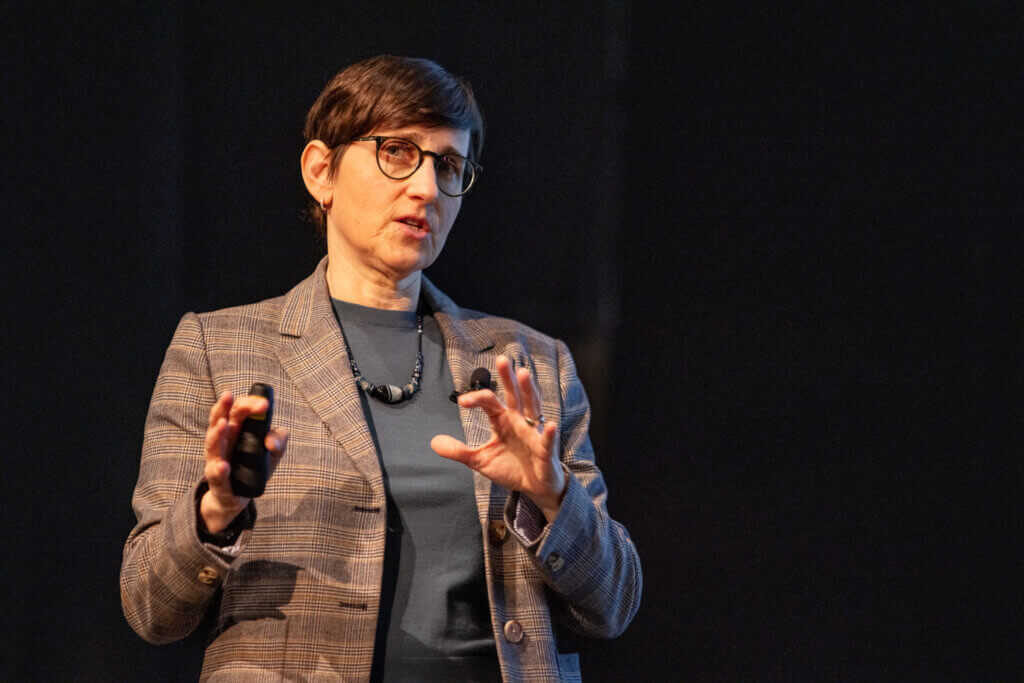
On the evening of January 27, the School of Science welcomed guest speaker Dr. Robin Leichenko, Distinguished Professor and Dean of Social & Behavioral Sciences at Rutgers University, for the first Climate Teach-In of 2025. Dr. Leichenko spoke to the three spheres of sustainability: the practical, personal, and political dimensions of sustainable transformation. Her research at Rutgers University on the “cChallenge” encourages students to make a sustainable commitment in their lives for 30 days, an activity that the audience of more than 60 students and teachers could benefit from replicating in their own lives and classrooms. As evidenced in questionnaires and surveys, students make practical changes in their lives toward a more sustainable lifestyle, leading to personal and even political transformations as they communicate their thoughts, experiences, and results with others. This research demonstrated the need to provide space and opportunities in our classrooms where students can put their sustainable knowledge into practice and the ripple effect this has in their own lives and communities. This study began before the COVID pandemic and continued into its inception, resulting in elevated awareness on the intersections of climate change, public health, and sustainable transformations for those participants.
Dr. Leichenko clarified that “Transformations are possible and are underway,” and that a significant part of that is in scaling transformation—making small changes that add up. Using a case study in promoting cycling trails in rural areas, Leichenko expanded on how these spheres become relevant in our communities. Cycling infrastructure is a great example for how successful efforts in scaling transformation can benefit a community, it’s economy, and the people within it so long as it reflects and depends on the communities’ input for development. The most effective transformations, as Leichenko explained, have to prioritize members in those local communities who are closest to the issue.
The event concluded with a Q&A session on Dr. Leichenko’s research, her experience as a Distinguished Professor and Dean at Rutgers, and her observations on sustainable initiatives on campus and in student’s lives.
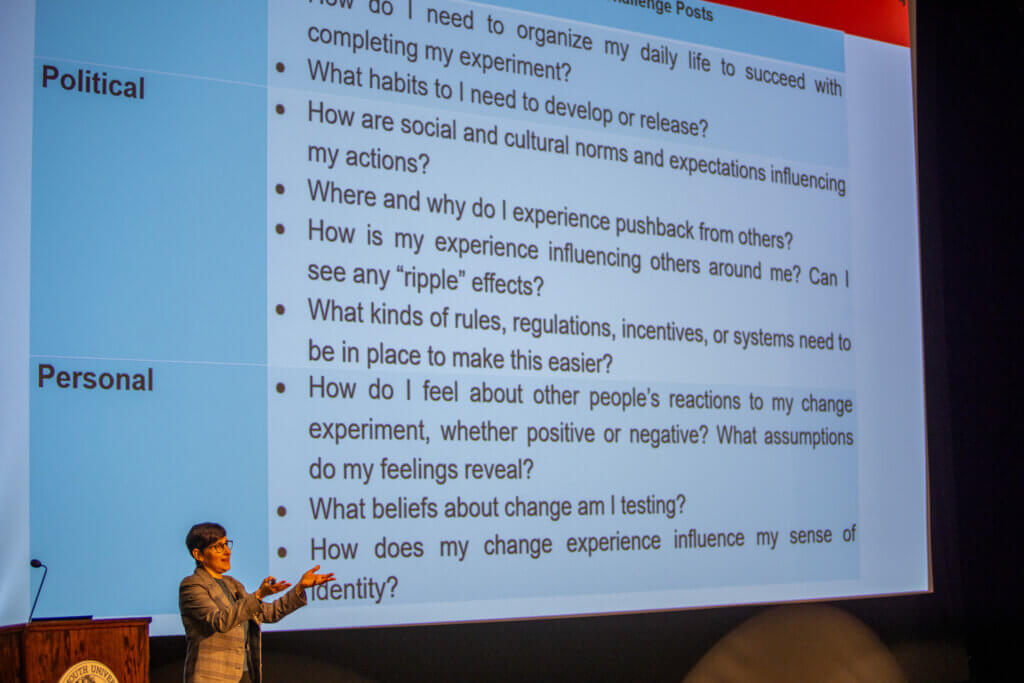
-
Equity and Inclusion Teaching Awards

Employee head shot: Torrey Gallagher, Mathematics 
Computer Science and Software Engineering Professor Weihao Qu. 
Laura Turner, Mathematics department, head shot. November 10, 2021. Three professors receive equity and inclusion teaching awards
At the November School of Science faculty meeting Drs. Torrey Gallagher, Weihao Qu and Laura Turner received awards for their innovations in teaching that promote equity and inclusion. The awards were made in two categories innovations to Assessment and for innovations involving the entire syllabus. Innovations that stemmed from published strategies that promote equity and inclusion of persons underrepresented in each field or with evidence of success in the classroom were required.
Dr. Qu’s project entitled “Secure Database Design – ensuring student interest” won in the category of Assessment. Dr. Qu states “The key renovation is to provide students opportunities to pick up what they are most interested (or comfortable) into the assessment of their performance of the courses. This is inspired by the concept of Universal Design for Learning(UDL) and Classroom Assessment Techniques(CATs)[ from the inclusive STEM online course.” Instead of giving students in CS/SE 450 a standard examinations Dr. Qu asked students to designed their own database in a competition that satisfied the course requirements. Dr. Qu reported high student learning as assessed by the database design and a later quiz, as well as higher student participation and satisfaction.
In the category of Improvements to Entire Syllabi, Drs. Gallagher and Turner were both recognized.
Dr. Gallagher’s submission “Skeletal Outlines for Better Outcomes in Math 117” provided skeletal outlines of course content for every class meeting of Math 117 (quantitative Analysis for Business I) in the Spring semester 2024. These skeletal outlines included a review exercise to begin each class meeting, theoretical sections with few blanks for student work and all crucial theoretical points typed out at least once, carefully scaffolded examples, building from mostly typed out to mostly blank, when applicable, problem-solving strategies for word problems were also scaffolded. The rationale for these outlines was the combination of poor student note taking and the reliance of the course on algorithms, the combination did not make for strong student outcomes. After using the outlines, Dr. Gallagher observed that both the average and median grades rose in his class from the prior year where no outlines were provided and that students found the outlines “very helpful”.
Dr. Laura Turner’s “Course Curriculum Revisions: exposing students to diverse voices in MA 325 (History of Mathematics)” Dr. Turner chose to focus on the importance of representation in Mathematics and to assign a scaffolded series of assignments beginning with picture a mathematician” and proceeding through a series of assignments, including written and graphic works where students not only highlighted mathematicians from historically underrepresented groups but critiqued the works of others for completeness and biases. The rationale for this revision is “while many view mathematics as apolitical and objective, research on the history of the subject contains many examples to the contrary. Moreover, MA 325 is largely populated by students who will become mathematics teachers, and their exposure to these subjects is critical not only to their own growth and development but also those of their future students. An understanding of the state of the discipline and how we find our places within it is also vital to anyone who seeks to practice mathematics within academia, industry, business, or government.” Selected graphic works are reproduced below.



-
CSSE students earn Upsilon Pi Epsilon Scholarships
CSSE students Omar Ahmed and Andrew Catapano recently received the 2024 Upsilon Pi Epsilon (UPE) Scholarship Award. Omar is a senior Computer Science student actively involved on campus, serving as a Peer Mentor for the School of Science, a Mathematics Tutor, and a PAL for Chemistry and Biology courses. Andrew is a graduate computer science student who, as an undergraduate, won the Academic Excellence Award from the CSSE department last year and serves as the Vice President of the eSports Club and is a member of Monmouth’s IEEE/ACM Club, where he assisted in successfully organizing the high school programming competition in Spring 2024.
The Upsilon Pi Epsilon Association (UPE) is the only international honor society for the computing and information disciplines, with chapters in more than 300 colleges and universities in North America and overseas. The mission of the Kappa Chapter of Upsilon Pi Epsilon at Monmouth University is to recognize academic excellence in the computing and information disciplines at both the undergraduate and graduate levels. Membership in UPE is primarily based on the academic records of students pursuing degrees in the computing and information disciplines.
-
Professor Qu awarded NSF grant.
We are thrilled to announce that Professor Weihao Qu was awarded an NSF CRII grant titled: Precise Formal Verification of General Relational Quantitative Properties with Mutable Arrays. The award is for nearly $180,000 for work over the next two years.
Project Summary: Modern software systems often juggle sensitive data, user privacy, and efficiency, all while navigating complex real-world scenarios. To ensure these qualities, researchers rely on relational reasoning, analyzing how a program behaves with different inputs or under varying conditions. While this approach is powerful, current tools often fall short when it comes to handling features like mutable arrays, a key data structure in many practical applications.This groundbreaking project introduces a new formal verification framework designed to overcome these challenges, enabling precise and general analysis of programs that use mutable arrays. By employing fine-grained techniques, the framework captures the behavior of individual array elements instead of treating arrays as a whole. This approach leads to significantly more detailed and accurate verification results.
The research also pushes the boundaries of relational reasoning by generalizing existing methods to support a wider range of relational quantitative properties. These advancements will be integrated into a unified framework, blending theoretical breakthroughs with practical tools, and rigorously evaluated on real-world software. By addressing critical gaps in precision and applicability, this work has the potential to reshape how we understand and verify software, paving the way for systems that are more secure, private, and efficient. This project not only bridges theoretical and practical divides but also sets a new standard for software correctness and reliability in an increasingly data-driven world.
-
Climate Crisis Teach-in 2025: Exploring the “How” of Sustainability Transformations
Monday, Jan. 27, 2025, 6:30 p.m. | Pollak Theatre
Addressing the climate crisis and related challenges provides many opportunities for promoting sustainability transformations. Yet significant questions remain about what such transformations might entail, how to support them, and how to sustain and scale these efforts. This talk explores the practical, political, and personal dimensions of transformation, drawing upon the model of the “Three Spheres of Transformation”. The talk also considers recent efforts to promote sustainability transformations, based upon the speaker’s work with university students and her on-going research on bicycling and non-motorized transportation infrastructure. The talk discusses implications and lessons learned from these case examples for fostering and supporting transformative change.
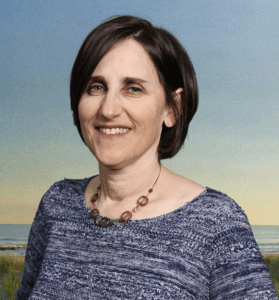
Leichenko is a distinguished professor of geography as well as dean of Social and Behavioral Sciences at Rutgers University. Her research explores the economic and equity dimensions of climate change impacts, vulnerability, and adaptation. Leichenko has led or served on climate change assessments for the City of New York, New Jersey, New York State, and the Intergovernmental Panel on Climate Change (IPCC). The second edition of her book, “Climate and Society: Transforming the Future” (Polity Press, with Karen O’Brien), was released in summer 2024.
-
Global Sustainability Minor
Monmouth University offers a minor focused on the interdisciplinary problems that impact and challenge future human and non-human prospects into the future. This area of study is rooted in both ancient traditions (like Indigenous perspectives) and new and developing science that shed light on urgent questions of our time. This minor provides a directed focus on these threats across multiple fields of study with multiple, critical perspectives. This minor has recently been updated and made more accessible to all students interested in these broad, global problems and their potential remedies. The minor provides both empirical and theoretical insight so as to allow a holistic and informed literacy in global sustainability.
The Global Sustainability minor provides a flexible and unique opportunity for students from any discipline and any major to participate and engage with complex systems, global ethical dilemmas, international politics, and changes to biological and geophysical planetary systems. This minor is one of several developments at Monmouth University that relates to environmental and sustainability studies that are increasingly relevant to our communities from the Jersey Shore to intercontinental earth processes that address the current pulse of extinctions, climate change, massive plastic pollution, and other major problems. You are invited to contact the Dean’s office in the School of Science care of Koorleen Minton (kminton@monmouth.edu), or Professor Peter Jacques (pjacques@monmouth.edu), who coordinates the minor, with any questions you may have.
Program Requirements
Requirements: (6 credits)
BY-221/PS-223 Introduction to Global Sustainability 3 credits
PS-332 Climate Change Adaptation and Policy 3 creditsElectives (9 credits):
AN/GO-275 Global Environmental Problems
BY-220 Environmental Biology and Policy
HE-340 Environmental Health Issues
PO/PS-330 Environmental Policy
PR-459 The Science and Politics of Climate Change
SC-130 Climate Science for 21st Century Citizens
SW-205 Global Human Rights and Social Justice
Total Credits 15 -
CSSE Senior Presents at IEEE International Conference in Malaysia
Computer Science Senior, Therese “Ez” Racancoj, traveled with Prof. Jay Wang to Kuching, Malaysia to attend the 2024 IEEE International Conference on Systems, Man, and Cybernetics from October 6th-9th. During the conference, Therese presented her research work on an IEEE funded project titled “Comprehensive Humanoid Robot Control Project Design and Development”.The goal of her research is to design and develop a set of reasonably challenging experimental projects that would allow students to fully explore the functions of humanoid robots and practice embedded software design skills for real-time robot control. The deliverables of this project can be used by scholars of the SMC society in their robotics related classes; they can also be used by industrial practitioners to learn about robot programming techniques.
“The opportunity to attend the international IEEE conference in Malaysia, especially while still an undergraduate, was an amazing experience of which I am extremely grateful to Professor Wang for. It was great being able to talk to people currently working in the tech field, not only to gain insight into what I have to look forward to in a future job but also because I was able to get to know some of the people who are dedicated to improving the field and making it that much more enjoyable.”
